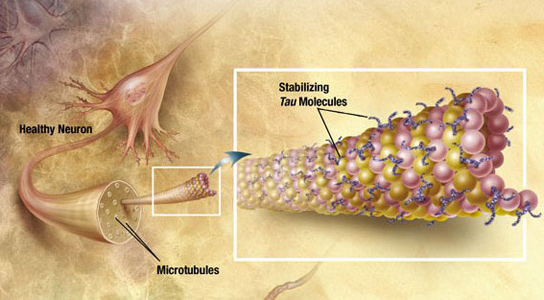Glia. 2015. doi: 10.1002/glia.22940. [Epub ahead of print]
Oligodendrocyte progenitor cell (OPC) differentiation is an important therapeutic target to promote remyelination in multiple sclerosis (MS). We previously reported hyperphosphorylated and aggregated microtubule-associated protein tau in MS lesions, suggesting its involvement in axonal degeneration.
However, the influence of pathological tau-induced axonal damage on the potential for remyelination is unknown. Therefore, we investigated OPC differentiation in human P301S tau (P301S-htau) transgenic mice, both in vitro and in vivo following focal demyelination. In 2-month-old P301S-htau mice, which show hyperphosphorylated tau in neurons, we found atrophic axons in the spinal cord in the absence of prominent axonal degeneration.
These signs of early axonal damage were associated with microgliosis and an upregulation of IL-1β and TNFα.
Following in vivo focal white matter demyelination we found that OPCs differentiated more efficiently in P301S-htau mice than wild type (Wt) mice. We also found an increased level of myelin basic protein within the lesions, which however did not translate into increased remyelination due to higher susceptibility of P301S-htau axons to demyelination-induced degeneration compared to Wt axons.
In vitro experiments confirmed higher differentiation capacity of OPCs from P301S-htau mice compared with Wt mice-derived OPCs. Because the OPCs from P301S-htau mice do not ectopically express the transgene, and when isolated from newborn mice behave like Wt mice-derived OPCs, we infer that their enhanced differentiation capacity must have been acquired through microenvironmental priming. Our data suggest the intriguing concept that damaged axons may signal to OPCs and promote their differentiation in the attempt at rescue by remyelination.
So this study indicates that neurons that are damaged send signals to make oligodendrocytes and indicate some thing intriguing that their own study published a month earlier also shows that nerves influnece myeliniation and shows that electrical activity from nerves stimulate oligodendrocytes to differenetiate and make myelin
